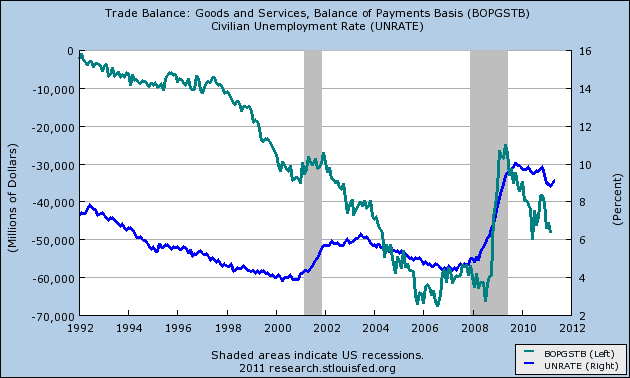Wonky Pundit
USMB's Silent Snowden
Want to know one of the top reasons that so many jobs have gone overseas? In the US, tariffs on manufactured goods (where they exist at all) average anywhere from 2-5%. In China, that rate is about 22%. In India, its 40%. Why arent patriotic Americans talking about this?
Genuine free trade, by definition, and its resulting benefits cant exist unless both trading partners are playing by the same rules. Because "trade" is a two way street, "free trade" can exist only with equal tariffs whether the rate is 0% or 50%. Without the balance, a much lower American import tariff just contributes to the erosion of our borders (and sovereignty) and an open door for the world to plunder our economy. The result would be, and has been, an exploding trade deficit that, if left unchecked, will eventually, maybe rapidly, destroy whats left of the economy.
When other countries have much higher import tariffs than we do, heres what happens:
First, their industrial base gains advantages from its protectionist tariffs if we don't match theirs. These manufacturers enjoy reduced or zero competition from their US counterparts. They can take the resulting increased profits and use them for R&D, better manufacturing equipment, and so on. Then, their products become even better and cheaper, making it difficult if not impossible for American manufacturers to compete in our own market as well as in the global market. All Americans suffer from this.
Second, lower import tariffs in the US dont encourage the reduction or elimination of tariffs by other nations. They simply have no incentive. The purest model of free trade will only be achieved through the imposition of matching tariffs. The unilateral imbalance of US tariffs works against the pursuit of global free trade.
Free market absolutists will counter these arguments by claiming that any restrictions on trade impoverish those who are restricted. What they dont realize is that this rule only applies to the consumer from the country with the high tariff and not to the manufacturer from the country with the lower tariff. You cant ignore either one.
Genuine free trade, by definition, and its resulting benefits cant exist unless both trading partners are playing by the same rules. Because "trade" is a two way street, "free trade" can exist only with equal tariffs whether the rate is 0% or 50%. Without the balance, a much lower American import tariff just contributes to the erosion of our borders (and sovereignty) and an open door for the world to plunder our economy. The result would be, and has been, an exploding trade deficit that, if left unchecked, will eventually, maybe rapidly, destroy whats left of the economy.
When other countries have much higher import tariffs than we do, heres what happens:
First, their industrial base gains advantages from its protectionist tariffs if we don't match theirs. These manufacturers enjoy reduced or zero competition from their US counterparts. They can take the resulting increased profits and use them for R&D, better manufacturing equipment, and so on. Then, their products become even better and cheaper, making it difficult if not impossible for American manufacturers to compete in our own market as well as in the global market. All Americans suffer from this.
Second, lower import tariffs in the US dont encourage the reduction or elimination of tariffs by other nations. They simply have no incentive. The purest model of free trade will only be achieved through the imposition of matching tariffs. The unilateral imbalance of US tariffs works against the pursuit of global free trade.
Free market absolutists will counter these arguments by claiming that any restrictions on trade impoverish those who are restricted. What they dont realize is that this rule only applies to the consumer from the country with the high tariff and not to the manufacturer from the country with the lower tariff. You cant ignore either one.



